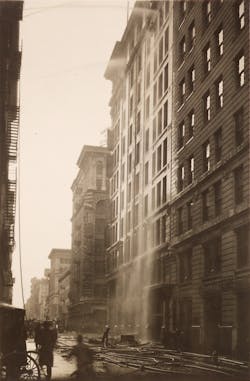After 100 Years: Lessons Learned from Triangle Shirtwaist
Anniversaries serve several purposes; to remember, to honor, to get a day off, maybe even an excuse to throw a party and fire up the grill, but most of all, it is supposed to give us the opportunity to remember the sacrifices of those who created the anniversary and take forth lessons learned so it does not happen again. In this reactive versus proactive country of ours we all know that the majority of the anniversaries we celebrate and commemorate surround tragedy and death.
March 25, 2011 marked the 100th anniversary of an event that all of us in the fire service profession need to study like a fire service history book. It is said that, "Those who do not learn from history are doomed to repeat it," and we in the fire service profession are the educators of all things fire, and as any good instructor worth his salt will tell you that, "If the student failed to learn, then the instructor failed to teach." So why is it that our history is riddled with continuous tragedy resulting from the same causes that we are all too well aware of?
The fact that many of you who are reading this have no idea what occurred on this date speaks volumes of our failure in the fire service to educate ourselves and learn from the past. Thus proving, we are complacent and not progressing, we are simply existing in a stagnant state of denial and continuing to do an injustice to those who have lost their lives to fire -- those we were supposed to protect and those we should now honor.
Fire has plagued our country since its founding in Jamestown, VA, in 1607. It was a fire that nearly caused the failure of the first English settlement in the New World. Capt. John Smith, leader of the expedition who founded Jamestown, was quoted in a journal as stating something along the lines of, "if not for the idiots who misfire their rifles or burn their homes down in the night, I'd be safer in the wilderness with the Indians." It was a major fire that eventually lead to the abandonment of Jamestown and a loss of life to the initial settlers -- a fire that started, spread, and destroyed for largely the same reasons it did in 1788, 1794, 1871, 1872, and 1906 just to highlight a few. But we did eventually learn a lesson, and we did finally progress.
In those days we built out of wood, to include the chimneys to warm our homes in the cruel pre-global warming North American climates, and built those homes and buildings in close proximity to one another for protection from the savages. But it was those serious fire conflagrations that finally brought about the lessons learned that began to change all that.
The Great London Fire of 1666 began to change the way the English, of which we still were, thought about fire protection and building. For example after the Great London Fire, England began building out of brick, with proper fire separations in mind, along with an adequate water supply for fire suppression. Eureka!
This progressive mindset began to filter across the ocean to the Americas. Buildings in the Americas also began to be constructed of brick because brick does not burn. This form of building became popular and as major fires began to decline we became complacent and stopped progressing, we were simply existing in a stagnant state of denial as we developed a false sense of security in codes, as we still do today. We believed that our new building innovations were the "end all" of fire prevention.
No one at this point had given any thought to what it was we put inside those brick buildings as it relates to fire. So then just as the White Star Line bragged that their ship, the Titanic, was "unsinkable," so did Joseph Asch claim that his building, that housed the Triangle Shirtwaist Factory, was "fire proof." After all it was made of brick -- the best in fire prevention.
Usher in lesson number two resulting from a tragedy; 100 years ago on March 25 at the Triangle Shirtwaist factory in New York City, within 30 minutes from the discovery of fire to its extinguishment, an eighth floor fire quickly spread out of control and claimed the life of 146 Triangle workers, the majority of which were female, many jumping to their death, and some as young as 13 years old. They died for the same reasons many before them had died and still die today -- the results of lessons gone unlearned. Still today we do not honor their death.
If there was ever an example of fire protection lessons being ignored, loop holes in the code being exploited, warnings from fire officials going unheeded, the need and justification for sprinkler systems, politics prevailing over common sense -- this fire was it.
As before there were major advancements in the aftermath of this fire. Not only major labor law reforms and the advancement of Woman's Suffrage, but the seeds of the life safety code were planted; and for the first time in building history, we not only looked at the construction of the building as it related to fire safety, but now what we put inside those buildings. Codes written in blood went into the book.
One again fire deaths began to decline, and once again we developed a false sense of security and became complacent; we again stopped progressing, and simply existed in a stagnant state of denial as a false sense of security in the written code took hold.
Lesson Learned
So here is the new lesson to be learned on this 100th anniversary: codes are only part of the solution! Any comprehensive fire prevention program must also have an educational/training element. We could continue to develop the strictest of codes and we could enforce them all to the letter! We could build a building that is 100 percent fire resistant, install a sprinkler system, mount fire extinguishers every 75 feet, install exit signs with life time illumination above double exit doors that swing outward on every exterior wall, etc…yet if we have not taken the time to educate and train the building's occupants…what have we really accomplished?
Without education and training for the occupants: fire resistive walls will be breached, sprinkler systems will not be maintained, sprinkler heads obstructed and used to hang material, fire extinguishers will go unused or not used correctly or go un-serviced or be hidden due to their un-decorative appearance, exits will be locked and egress paths obstructed, business staff will not know how to react and panic will ensue…you get the picture?
While we could catch these violations during routine inspections, for those few departments that have the resources to do routines inspections and visit each building in their jurisdiction every year, we all know what happens once the inspector leaves the building…everything goes back to business as usual. While we may have enforced the code, we have not educated and that lack of education equates to ignorance which breeds indifference, and both are the cause of 99.9 percent of all unintentional fires.
If you are a student of fire in the fire service, and anyone calling themselves a professional in any endeavor should always continue to be a student and continue to study and learn, and you study fires and fire deaths, the lesson to be taught is that we cannot rely on codes alone to solve our fire problem. A true prevention program has a codes element and an education/training element.
Anniversaries in the fire service offer us an opportunity to do such study, and on this tragic anniversary there is much we need to learn to prevent it from occurring again; as professionals in the fire service profession, we owe that to the victims, to their families, to potential future victims, and to our fellow firefighters who will risk their lives at these fires. We have a moral conviction to do everything and anything we can that will lead to saving a protecting, and we need to start learning.
DANIEL BYRNE, a Firehouse.com Contributing Editor, is a firefighter/paramedic, with the Burton Fire District in Burton, SC. A 20-year veteran of the emergency services, he holds both an associate and bachelors degree in fire science, is a National Fire Academy Alumni, and a veteran of the Desert Shield/Storm war with the U.S. Marine Corps. Daniel is the recipient of local and state awards for public educations and relations. Daniel is moderator of the Fire Prevention and Life Safety forums on Firehouse and has been guest on two Firehouse.com podcasts: 2010 Fire and Life Safety Roundtable and Developing and Adapting Successful Fire Prevention Applications. View all of Daniel's magazine and online articles here. You can reach Daniel by e-mail at [email protected].
About the Author

Daniel Byrne
DANIEL BYRNE is a community support officer for the Burton Fire District, Beaufort County, SC, and a retired assistant fire chief of training for the Georgia Air National Guard 165th Fire Department. A third-generation firefighter, he holds an associate degree and a bachelor’s degree in fire science as well as a master’s degree in public administration and disaster management. Byrne is an alumnus of the National Fire Academy. He received state and local awards for public relations and educational programs as well as community partnerships and served as a conference presenter and keynote speaker.
